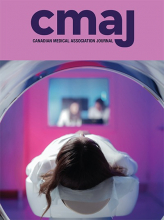Alcohol-associated hepatitis results in acute hepatic dysfunction
The condition occurs in people who consume more than 3 (females) or 4 (males) standard alcoholic drinks per day.1,2 Severe alcohol-associated hepatitis has a 20%–50% mortality rate.3
Symptoms include fever, abdominal pain and jaundice
Characteristic laboratory findings include moderate transaminase elevation (50–400 IU/L), aspartate transaminase to alanine transaminase ratio of more than 1.5, coagulopathy and hyperbilirubinemia (> 51.3 μmol/L).1,2 About 50% of patients have underlying cirrhosis and may have co-existing decompensation (e.g., ascites, gastrointestinal bleeding, encephalopathy).4 A liver biopsy may be cautiously considered if surreptitious alcohol use is suspected, or if alternate causes of hepatitis (e.g., viral, autoimmune, drug-induced) cannot be excluded.2
Prognostic scores should be used to determine if corticosteroid treatment is indicated
Corticosteroids do not improve 1-year mortality but do improve short-term survival.1,4 In addition to best supportive care, clinicians should consider prednisolone (40 mg/d) in patients with severe alcohol-associated hepatitis (Model for End-Stage Liver Disease score > 20 [https://www.mdcalc.com/calc/10437/model-end-stage-liver-disease-meld?utm_source=site&utm_medium=link&utm_campaign=meld_12_and_older]), assuming no contraindications are present (e.g., infection, gastrointestinal bleeding, severe renal impairment, shock).1,4 After 7 days, the Lille model should be calculated (https://www.mdcalc.com/calc/2024/lille-model-alcoholic-hepatitis). Scores greater than 0.45 suggest steroid nonresponsiveness. In this case, treatment should be stopped because corticosteroids increase the risk of infection, a leading cause of death in patients with alcohol-associated hepatitis. Pentoxifylline is not recommended.4
Abstinence from alcohol is crucial
Alcohol use is the primary predictor of death after an episode of alcohol-associated hepatitis.4 Treatments to promote alcohol abstinence include counselling, cognitive behavioural or motivational therapy, mutual aid societies, inpatient alcohol rehabilitation and anti-craving therapies (e.g., naltrexone, acamprosate).1 Patients also benefit from high-protein and high-calorie diets with vitamin B and D supplementation.1
Consider referral for liver transplant before 6 months of abstinence
Clinicians should seek a transplant assessment when patients with severe alcohol-associated hepatitis are nonresponsive to medical therapy, commit to alcohol abstinence and are deemed a low risk for relapse. Transplantation improves survival, with most patients maintaining alcohol abstinence 2 years after transplantation.5
Acknowledgments
The authors thank Dr. Shail Rawal for suggesting the topic and for reviewing the manuscript and Dr. Scott Fung for reviewing the manuscript.
Footnotes
Competing interests: Dr. Silverstein has received funding from the HoPingKong Centre for Excellence in Education and Practice as a clinician scholar fellow. Cynthia Tsien has received an unrestricted educational grant from Paladin. She has also received honoraria from Lupin. No other competing interests were declared.
This article has been peer reviewed.
This is an Open Access article distributed in accordance with the terms of the Creative Commons Attribution (CC BY-NC-ND 4.0) licence, which permits use, distribution and reproduction in any medium, provided that the original publication is properly cited, the use is noncommercial (i.e., research or educational use), and no modifications or adaptations are made. See: https://creativecommons.org/licenses/by-nc-nd/4.0/











